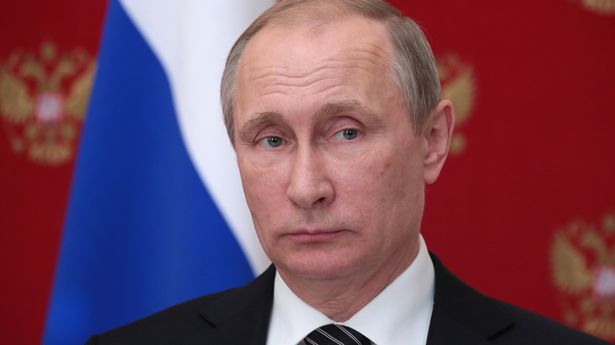From falling out of windows to being poisoned with Novichok, Vladimir Putin's opponents have often met a gruesome fate.
The Russian President has been blamed for organising the assassinations of his biggest critics over the years, with the Kremlin insisting this isn't the case. Many of the deaths are never solved and officially put down to accidents or suicides, leaving us wondering just how many enemies Putin has dispatched.
Back in February, human rights activist Bill Browder claimed the despot had a hit list of at least 12 targets in the wake of democracy fighter Alexei Navalny's death. Alexei was a political activist who many believe was murdered by the regime.
"The killing of Alexei Navalny has shown Putin has lost all restraint and that he will embark on a major international killing spree which will include against all his enemies in the UK," Browder told the Mirror. "I believe there are at least a dozen people here at risk and they will focus on high-profile ones."
As Putin's top crony issued a shock World War Three warning claiming the next global conflict had already begun, we take a look at the brutal methods said to be employed by the Russian despot - including famous poisonings which took place on British soil...
Trademark punch
Many theories have emerged about Navalny's death in prison and Russian exile and human rights campaigner Vladimir Osechkin has said that sources claim he was murdered by a single punch to his heart. He told The Times: "It is an old method of the KGB's special forces divisions. They trained their operatives to kill a man with one punch in the heart, in the centre of the body. It was a hallmark of the KGB."
Others have pointed to alleged signs of bruising found on his body as evidence of mistreatment, and Mr Osechkin said he believes Navalny would have been put in open-air solitary confinement, exposing him to extreme cold temperatures that would make it "very easy to kill someone".
Shot dead
Boris Nemtsov, the leader of the Russian opposition was shot dead in front of the Kremlin seven years ago. Nemtsov, then one of Russia's most outspoken critics of Putin, had at the time of his death been organising opposition rallies against Russia's military involvement in Ukraine. He became deputy PM and was once touted as a possible presidential candidate - but it was Putin who took over from former president Boris Yeltsin in 2000.
On Putin's birthday, October 7, 2006, journalist Anna Politkovskaya was shot and killed in the lift of her Moscow apartment building. She won international acclaim for her reporting on human rights abuses in Chechnya for the newspaper Novaya Gazeta. The gunman, from Chechnya, was convicted of the killing and sentenced to 20 years in prison and four other Chechens were given shorter prison terms for their involvement in the murder.
Poisoned tea
Vladimir Kara-Murza is a prominent opposition activist who twice survived poisonings in 2015 and 2017 that he blamed on the Kremlin. And Alexander Litvinenko was a Russian spy who died in 2006 after he was poisoned with radioactive polonium-210 while drinking tea at London's Millennium Hotel. He had been investigating the shooting death of Russian journalist Anna Politkovskaya as well as the Russian intelligence service's alleged links to organised crime.
Another former Russian intelligence officer, Sergei Skripal, was poisoned in Britain in 2018. He and his adult daughter Yulia fell ill in the city of Salisbury and spent weeks in critical condition. They survived, but the attack later claimed the life of a British woman and left a man and a police officer seriously ill. Authorities said they both were poisoned with the military-grade nerve agent novichok. Britain blamed Russian intelligence, but Moscow denied any role.
Sudden illness
Yuri Shchekochikhin, another Novaya Gazeta reporter, died of a sudden and violent illness in 2003. He was investigating corrupt business deals and the possible role of Russian security services in the 1999 apartment house bombings, which at the time were blamed on Chechen insurgents. His colleagues claimed he was poisoned and accused the authorities of deliberately hindering the investigation.
Plane crash
Yevgeny Prigozhin and top lieutenants of his Wagner private military company died in a plane crash in August 2023 - two months to the day after he launched an armed rebellion that Putin branded "a stab in the back" and "treason". In a televised address from his offices, Putin said his ex-pal was a "man of difficult fate" and that he "made serious mistakes in life".
A preliminary intelligence assessment found that the crash that killed all 10 people aboard was intentionally caused by an explosion, according to U.S. and Western officials. The officials spoke on condition of anonymity because they were not authorised to comment. One said the explosion fell in line with Putin's "long history of trying to silence his critics".
Dmitry Peskov, denied allegations the Kremlin was behind the crash, telling reporters: "Of course, in the West those speculations are put out under a certain angle, and all of it is a complete lie." Former Kremlin speechwriter turned political analyst, Abbas Gallyamov, said: "Putin has demonstrated that if you fail to obey him without question, he will dispose of you without mercy, like an enemy, even if you are formally a patriot."
